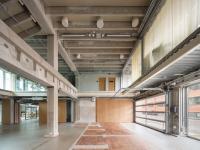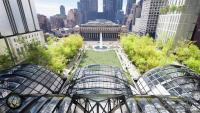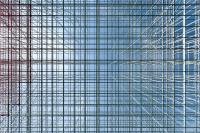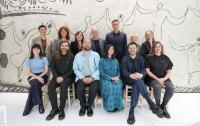Jobsveem
Rotterdam, Países Bajos
The former warehouse and national monument Jobsveem, also known as St. Job, on the quay of the Lloyd Pier in Rotterdam, has been changed significantly. The warehouse was originally a substantial industrial building. The design by Mei architects and planners breathes new life into the old warehouse.
Since its completion in 1913, the former warehouse had been extremely introverted in character. This closed character was intended to protect the stored goods from too much daylight, rain and wind. The structure involved the use of construction methods that were very advanced for their time. The large-scale stacked structure with concrete galleries and loading bays is an example of such, as is the stacked structure of timber floors and cast-iron columns filled with concrete.
The levels of Jobsveem are characterised by long floors (130 x 25 m) with cast-iron columns of different heights and conditions. The warehouse is an important national and municipal monument because its use for loading and unloading resulted in a uniquely expressive façade of concrete loading decks on the side facing the water.
Daylight
The conversion of the warehouse into apartments and commercial spaces was an opportunity to bring daylight into the building. The unique character was preserved while three glazed atriums allow daylight to enter. They provide the adjoining dwellings with views. The concentrated intervention of the atriums preserves the characteristic appearance of the warehouse. The light courts of glass and steel emphasise the monumental components that have been carefully restored in the warehouse.
Located in the atria are the main staircases, lifts and entrances. They are lively, light spaces where residents can meet one another. These courts can also combat heat and smoke when needed. In warm weather, and also in the event of calamities such as fire, the glazed roof opens and a light breeze blows through the atrium.
Roof landscape
The floors could be organised as desired because of the absence of bearing walls. The same flexibility can be found in the apartment plans. The roof had to be removed because of its poor condition. Inserted in its place is a new floor that crowns the building like a shed. Housed in this new roof landscape are ten penthouses for which special large glazed sliding panels were developed.
Located on the ground floor are the commercial spaces that are imposing in appearance owing to the 6-metre floor-to-ceiling height. Space for restaurants and cafés is created in two places on the ground floor. The other spaces are reserved for creative companies. Located behind the big loading bay doors on the ground floor are glass doors that open out towards the quay. Owing to safety and light-control factors, steel frames are filled with mesh woven from stainless steel and can move up and down like lift gates. Old and new meet here.
A lasting community
The sale of all apartments within two weeks illustrates the success of Jobsveem. Even today, apartments here rarely come on the market. The building is home to a community of more than 200 enthusiastic residents who have taken to the warehouse with heart and soul. This love finds expression in, among others, the initiative to compile and publish a book about the design of the loft apartments by the residents themselves.
- Arquitectos
- mei architects and planners
- Ubicación
- Lloydstraat, Rotterdam, Países Bajos
- Año
- 2007
- Cliente
- BAM Vastgoed, BAM Volker Bouwmaatschappij
- Program and size
- 21.000 m2 99 apartments and 10 penthouses
- Team
- Robert Winkel, Robert Platje, Jos Schäffer, Bart Spee, Jane Nagtegaal, Nars Broekharst, Tim Knip, Richel Lubbers, Jojanneke van den Bosch, Anja Biel













